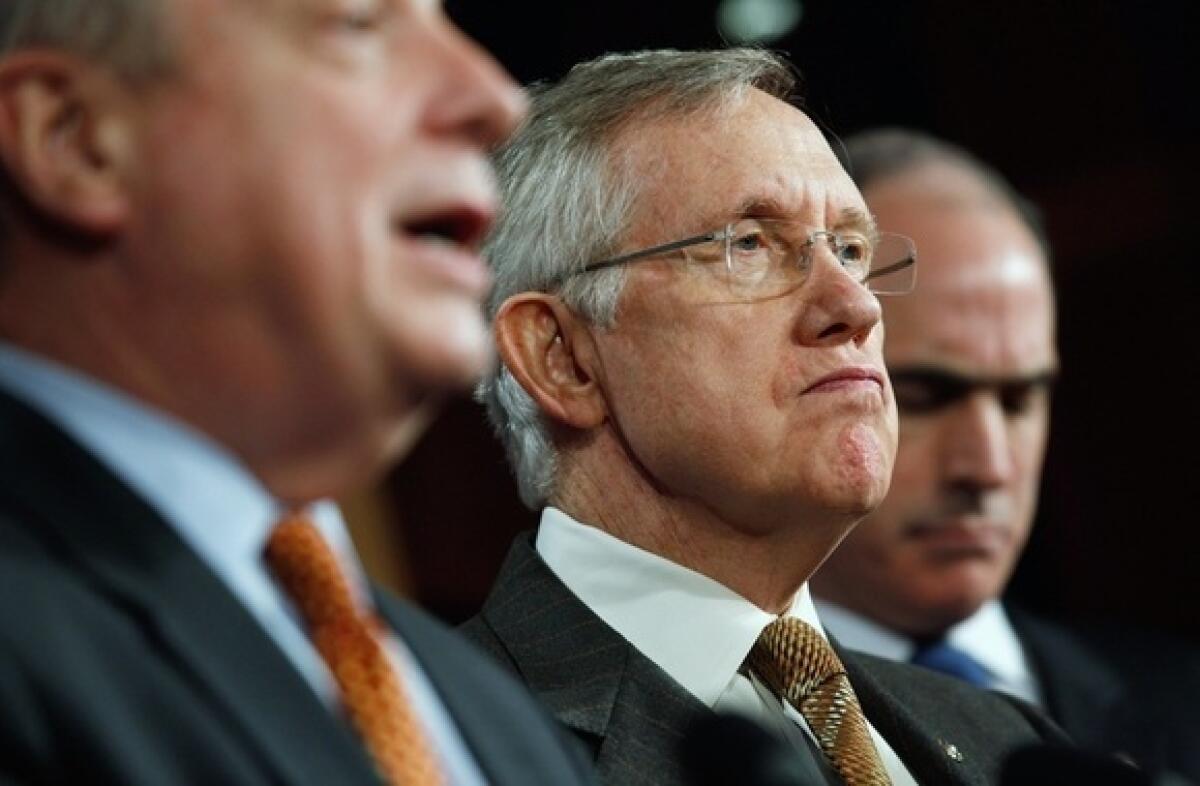New brinkmanship in fight over payroll tax cut extension

- Share via
The hard-fought politics of approving President Obama’s payroll tax break erupted on full display Tuesday when Democrats stalled a must-pass spending bill needed to keep the government running as negotiations with Republicans have floundered over a compromise proposal that would continue the expiring tax cut for 160 million workers.
Senate Majority Leader Harry Reid (D-Nev.) is unwilling to let the GOP-led House recess for the holidays without approving a continuation of the tax break, which is a priority for the White House and puts an additional $1,000 on average in workers’ paychecks.
The House on Tuesday is expected to approve Speaker John A. Boehner’s proposal to extend the payroll tax cut, but the bill Boehner compiled to attract reluctant Republican votes contains GOP priorities that are opposed by Democrats. Obama has vowed a veto.
To stop the House from heading home, Reid has refused to sign off on a must-pass bill needed to fund the government into 2012. That legislation was also headed for a vote this week, and its passage would have completed the House’s work.
With days remaining to strike a deal, the maneuvering put Washington’s sausage-making on display as both sides seek the advantage on issues that could carry politically heavy prices.
“They are wasting time catering to the tea party when they should be working with Democrats on a bipartisan package that can pass both houses,” Reid said Tuesday. “If Republicans continue to block these reasonable plans to cut taxes for 160 million workers, there will be consequences.”
Democrats say they are not just delaying the unrelated spending bill, having objections to GOP provisions on abortion, the coal industry, Cuba travel and other policies that have not been resolved. Republicans say the two sides had already sorted out those problem spots.
“I’m hopeful that the Senate leaders will come to their senses,” Boehner said. “There’s no reason to hold this bill up.”
The strategy of holding up the annual spending bill while the tax-cut issue gets resolved carries risk, and Republicans criticized Democrats for threatening a government shutdown. The spending bill is needed to keep federal offices running past Friday.
“Let me say that again: the president and the Democratic majority leader of the Senate are now saying they’d rather shut down the government than allow this job-creating legislation to become law,” said Sen. Mitch McConnell of Kentucky, the GOP leader.
The payroll-tax package Boehner compiled is expected to receive widespread Republican support in the House after he loaded it up with GOP priorities, including a provision to advance development of the controversial Keystone pipeline that Obama has vowed to veto.
Democrats say Boehner has spent so much time creating a package that could pass the GOP-controlled House that negotiations on a compromise bill that could be signed into law have stalled. Reid called Boehner on Monday and told him as much.
The payroll-tax measure contains a handful of other provisions that are objectionable to Democrats, including how to pay for the package. Democrats want to impose a surtax on those earning $1 million or more a year, while Boehner proposes spending cuts across various government functions.
Democrats also object to the GOP plan to scale back unemployment benefits for jobless Americans as well as a provision that would rollback air-emission standards on industrial boilers that emit mercury and other toxins.
Leaders from both sides say they want to continue the tax break, which expires Dec. 31, even though Boehner has struggled to bring his rank-and-file on board.
At a closed-door meeting of Republicans on Tuesday, much of the dissent had dissipated.
“We’re going to do what we were sent here to do,” Republican Rep. Blaine Luetkemeyer of Missouri said afterward. “Everyone is not happy with stuff. You always have to compromise.”
Conservative Rep. Jason Chaffetz of Utah delivered a message to his peers that underscored the politics of the situation before them.
“I stood up and said, ‘I’m really good at voting no. I spent two years mastering that. This has a lot of positive in it,’” Chaffetz said. He said he would go on to vote for the package.
More to Read
Sign up for Essential California
The most important California stories and recommendations in your inbox every morning.
You may occasionally receive promotional content from the Los Angeles Times.











